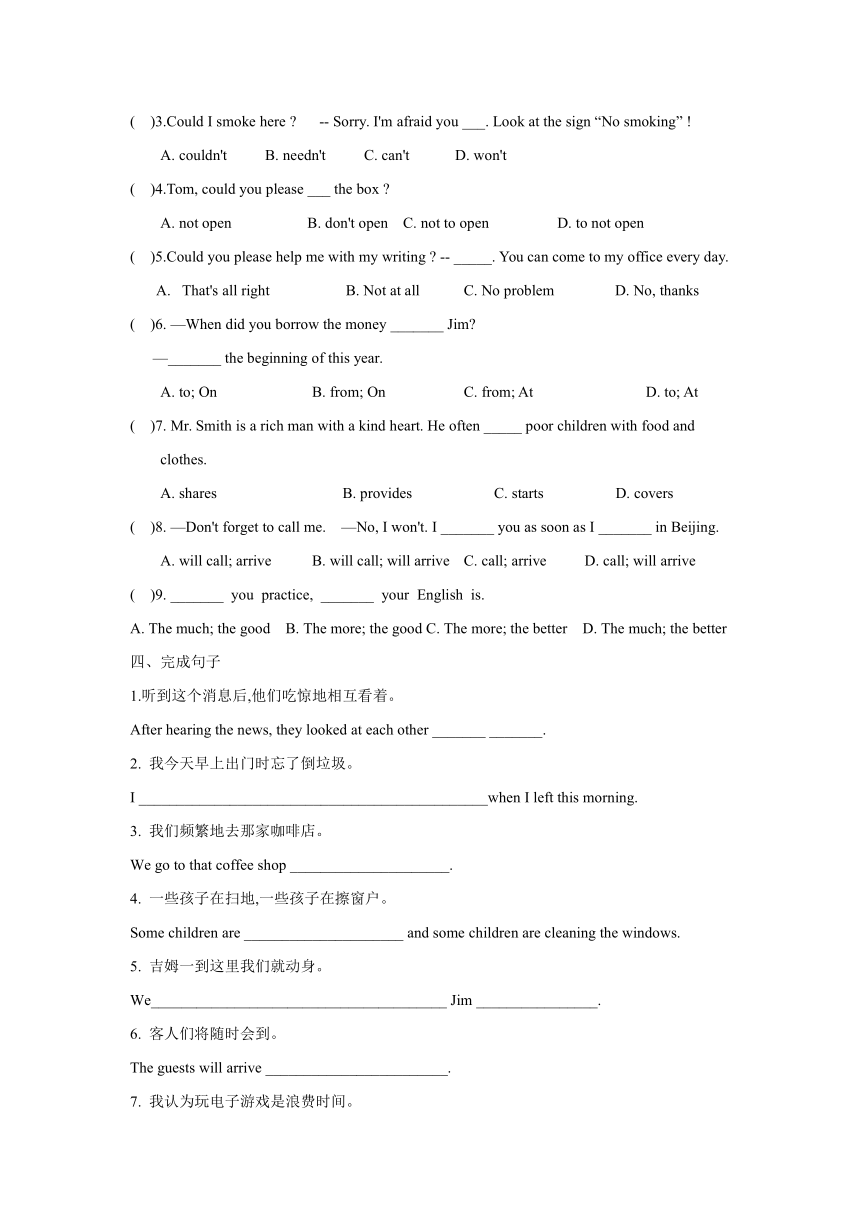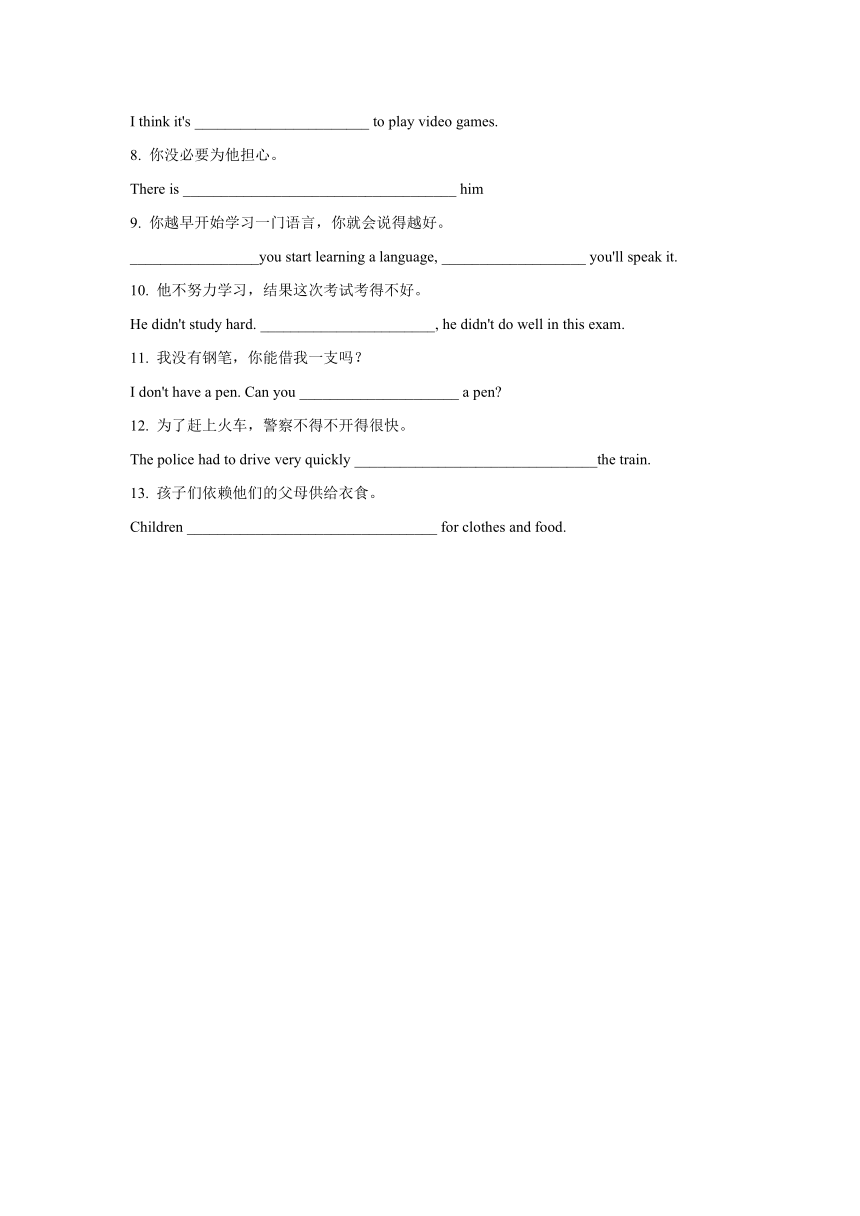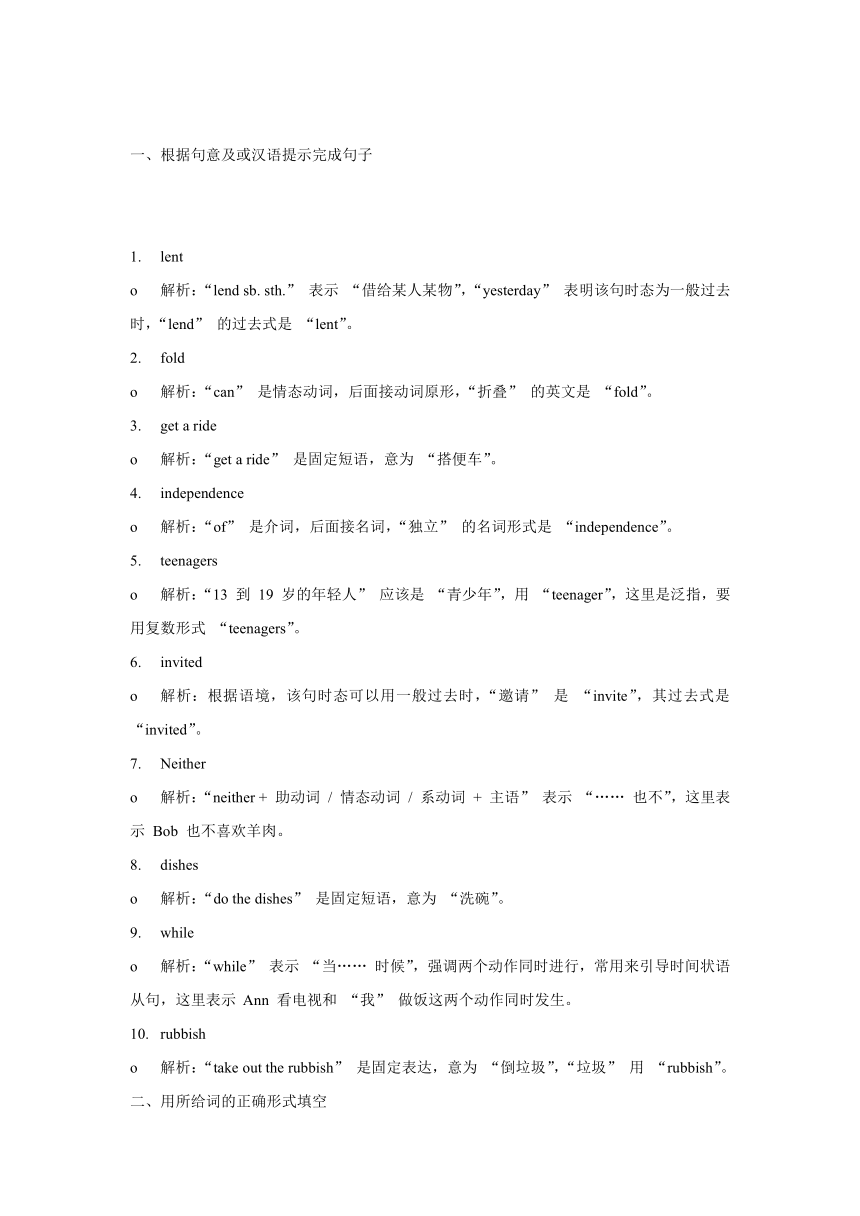Unit 3 Could you please clean your room基础习题(含解析)人教版八年级英语下册
文档属性
| 名称 | Unit 3 Could you please clean your room基础习题(含解析)人教版八年级英语下册 |

|
|
| 格式 | docx | ||
| 文件大小 | 29.3KB | ||
| 资源类型 | 教案 | ||
| 版本资源 | 人教新目标(Go for it)版 | ||
| 科目 | 英语 | ||
| 更新时间 | 2025-02-26 00:00:00 | ||
图片预览




文档简介
Unit 3基础习题
一、根据句意及或汉语提示完成句子
1. Helen (借出) me some money yesterday.
2. Can you ______(折叠)the clothes for his mother
3. Since you have a car, can I (搭便车) to the party tonight
4. Everyone should develop the ability of ______(独立).
5. Young persons from 13 to 19 years old are called _____(青少年).
6. My friend ______ (邀请) me to go to his parents’ house.
7. ---I don t like the mutton.
----______ (也不) does Bob.
8. I hate to do the ______(洗碗)after supper.
9. Ann was watching TV ______ (而) I was cooking.
10. Please take out the ______(垃圾).
二、用所给词的正确形式填空。
1. The girl is old enough ______ (make) her bed.
2. China is a _______(develop) country.
3. We should do our part in ______ (keep) our school clean and beautiful.
4. —Look! Whose child is that crying boy
—Oh, he's my (neighbor) son.
5. We did the same work, but he got more money than me. It was _____(fair) for me.
6. Could you please buy some _______(snack) for me
7. When did you finish (write) the book
8. China and India are ________ (develop) countries.
9. Many people think doing chores is woman`s job, but I don`t mind _______ (do) chores.
10. You have to brush your teeth at _______(little) twice a day.
三、单项选择
( )1. Neither I nor Tom _______ from China.
A.come B. comes ing D is come
( ) 2.Could you please ____ his bed -- Certainly !
A. makes B. making C. make D made
( )3.Could I smoke here -- Sorry. I'm afraid you ___. Look at the sign “No smoking” !
A. couldn't B. needn't C. can't D. won't
( )4.Tom, could you please ___ the box
A. not open B. don't open C. not to open D. to not open
( )5.Could you please help me with my writing -- _____. You can come to my office every day.
That's all right B. Not at all C. No problem D. No, thanks
( )6. —When did you borrow the money _______ Jim
—_______ the beginning of this year.
A. to; On B. from; On C. from; At D. to; At
( )7. Mr. Smith is a rich man with a kind heart. He often _____ poor children with food and clothes.
A. shares B. provides C. starts D. covers
( )8. —Don't forget to call me. —No, I won't. I _______ you as soon as I _______ in Beijing.
A. will call; arrive B. will call; will arrive C. call; arrive D. call; will arrive
( )9. _______ you practice, _______ your English is.
A. The much; the good B. The more; the good C. The more; the better D. The much; the better
四、完成句子
1.听到这个消息后,他们吃惊地相互看着。
After hearing the news, they looked at each other _______ _______.
2. 我今天早上出门时忘了倒垃圾。
I ______________________________________________when I left this morning.
3. 我们频繁地去那家咖啡店。
We go to that coffee shop _____________________.
4. 一些孩子在扫地,一些孩子在擦窗户。
Some children are _____________________ and some children are cleaning the windows.
5. 吉姆一到这里我们就动身。
We_______________________________________ Jim ________________.
6. 客人们将随时会到。
The guests will arrive ________________________.
7. 我认为玩电子游戏是浪费时间。
I think it's _______________________ to play video games.
8. 你没必要为他担心。
There is ____________________________________ him
9. 你越早开始学习一门语言,你就会说得越好。
_________________you start learning a language, ___________________ you'll speak it.
10. 他不努力学习,结果这次考试考得不好。
He didn't study hard. _______________________, he didn't do well in this exam.
11. 我没有钢笔,你能借我一支吗?
I don't have a pen. Can you _____________________ a pen
12. 为了赶上火车,警察不得不开得很快。
The police had to drive very quickly ________________________________the train.
13. 孩子们依赖他们的父母供给衣食。
Children _________________________________ for clothes and food.
一、根据句意及或汉语提示完成句子
1. lent
o 解析:“lend sb. sth.” 表示 “借给某人某物”,“yesterday” 表明该句时态为一般过去时,“lend” 的过去式是 “lent”。
2. fold
o 解析:“can” 是情态动词,后面接动词原形,“折叠” 的英文是 “fold”。
3. get a ride
o 解析:“get a ride” 是固定短语,意为 “搭便车”。
4. independence
o 解析:“of” 是介词,后面接名词,“独立” 的名词形式是 “independence”。
5. teenagers
o 解析:“13 到 19 岁的年轻人” 应该是 “青少年”,用 “teenager”,这里是泛指,要用复数形式 “teenagers”。
6. invited
o 解析:根据语境,该句时态可以用一般过去时,“邀请” 是 “invite”,其过去式是 “invited”。
7. Neither
o 解析:“neither + 助动词 / 情态动词 / 系动词 + 主语” 表示 “…… 也不”,这里表示 Bob 也不喜欢羊肉。
8. dishes
o 解析:“do the dishes” 是固定短语,意为 “洗碗”。
9. while
o 解析:“while” 表示 “当…… 时候”,强调两个动作同时进行,常用来引导时间状语从句,这里表示 Ann 看电视和 “我” 做饭这两个动作同时发生。
10. rubbish
o 解析:“take out the rubbish” 是固定表达,意为 “倒垃圾”,“垃圾” 用 “rubbish”。
二、用所给词的正确形式填空
1. to make
o 解析:“be + 形容词 + enough + to do sth.” 表示 “足够…… 去做某事”,所以这里用 “to make”。
2. developing
o 解析:“developing country” 表示 “发展中国家”,“developing” 是现在分词作定语,修饰 “country”。
3. keeping
o 解析:“do one's part in doing sth.” 表示 “在做某事方面尽自己的一份力”,所以用 “keeping”。
4. neighbor's
o 解析:这里表示 “邻居的儿子”,要用名词所有格形式,“neighbor” 的所有格是 “neighbor's”。
5. unfair
o 解析:根据前面说做同样的工作他比 “我” 得到更多钱,可知这对 “我” 来说是 “不公平的”,“fair” 是 “公平的”,其反义词是 “unfair”。
6. snacks
o 解析:“some” 后面接可数名词复数或不可数名词,“snack” 是可数名词,要用复数形式 “snacks”。
7. writing
o 解析:“finish doing sth.” 表示 “完成做某事”,所以用 “writing”。
8. developing
o 解析:“developing country” 表示 “发展中国家”,中国和印度都是发展中国家,所以用 “developing”。
9. doing
o 解析:“mind doing sth.” 表示 “介意做某事”,所以用 “doing”。
10. least
o 解析:“at least” 是固定短语,意为 “至少”,所以用 “least”。
三、单项选择
1. B
o 解析:“neither...nor...” 连接两个主语时,谓语动词遵循 “就近原则”,与 “Tom” 保持一致,“Tom” 是第三人称单数,所以动词用 “comes”,选 B。
2. C
o 解析:“Could you please do sth.” 表示 “请你做某事好吗”,后面接动词原形,所以选 C。
3. C
o 解析:“Could I... ” 表示请求许可,否定回答用 “Sorry. I'm afraid you can't.”,所以选 C。
4. A
o 解析:“Could you please not do sth.” 表示 “请你不要做某事好吗”,所以选 A。
5. C
o 解析:A 选项 “That's all right” 表示 “没关系”;B 选项 “Not at all” 表示 “一点也不,不用谢”;C 选项 “No problem” 表示 “没问题”;D 选项 “No, thanks” 表示 “不,谢谢”。这里表示愿意帮忙,用 “No problem”,选 C。
6. C
o 解析:“borrow...from...” 表示 “从…… 借……”;“at the beginning of” 表示 “在…… 开始的时候”,所以选 C。
7. B
o 解析:A 选项 “shares...with...” 表示 “和…… 分享……”;B 选项 “provides...with...” 表示 “给…… 提供……”;C 选项 “starts” 表示 “开始”;D 选项 “covers” 表示 “覆盖”。这里说 Mr. Smith 给贫穷孩子提供食物和衣服,用 “provides” 合适,选 B。
8. A
o 解析:“as soon as” 引导时间状语从句,遵循 “主将从现” 原则,即主句用一般将来时,从句用一般现在时,所以选 A。
9. C
o 解析:“The + 比较级,The + 比较级” 表示 “越……,就越……”,“practice” 是动词,用 “more” 修饰;“good” 的比较级是 “better”,所以选 C。
四、完成句子
1. in surprise
o 解析:“in surprise” 表示 “吃惊地”,在句中作状语。
2. forgot to take out the rubbish
o 解析:“forget to do sth.” 表示 “忘记去做某事”,“倒垃圾” 是 “take out the rubbish”,“left” 表明该句时态为一般过去时,“forget” 的过去式是 “forgot”。
3. all the time
o 解析:“all the time” 表示 “频繁地,一直”,符合 “频繁地去那家咖啡店” 的语境。
4. sweeping the floor
o 解析:“sweep the floor” 表示 “扫地”,“are” 表明该句时态为现在进行时,结构是 “be + 现在分词”,“sweep” 的现在分词是 “sweeping”。
5. will leave as soon as; arrives here
o 解析:“as soon as” 引导时间状语从句,遵循 “主将从现” 原则,主句用一般将来时 “will + 动词原形”,“动身” 是 “leave”;从句用一般现在时,“Jim” 是第三人称单数,“到达这里” 是 “arrive here”,“arrive” 用第三人称单数形式 “arrives”。
6. any minute now
o 解析:“any minute now” 表示 “随时”,符合 “客人们将随时会到” 的意思。
7. a waste of time
o 解析:“a waste of time” 表示 “浪费时间”,是固定表达。
8. no need for you to worry about
o 解析:“There is no need for sb. to do sth.” 表示 “某人没有必要做某事”,“担心” 是 “worry about”。
9. The earlier; the better
o 解析:“The + 比较级,The + 比较级” 表示 “越……,就越……”,“early” 的比较级是 “earlier”,“well” 的比较级是 “better”。
10. As a result
o 解析:“As a result” 表示 “结果”,用于引出结果。
11. lend me
o 解析:“lend sb. sth.” 表示 “借给某人某物”。
12. in order to catch
o 解析:“in order to do sth.” 表示 “为了做某事”,“赶上” 是 “catch”。
13. depend on their parents
o 解析:“depend on” 表示 “依赖,依靠”,“孩子们依赖他们的父母供给衣食” 即 “Children depend on their parents for clothes and food”。
一、根据句意及或汉语提示完成句子
1. Helen (借出) me some money yesterday.
2. Can you ______(折叠)the clothes for his mother
3. Since you have a car, can I (搭便车) to the party tonight
4. Everyone should develop the ability of ______(独立).
5. Young persons from 13 to 19 years old are called _____(青少年).
6. My friend ______ (邀请) me to go to his parents’ house.
7. ---I don t like the mutton.
----______ (也不) does Bob.
8. I hate to do the ______(洗碗)after supper.
9. Ann was watching TV ______ (而) I was cooking.
10. Please take out the ______(垃圾).
二、用所给词的正确形式填空。
1. The girl is old enough ______ (make) her bed.
2. China is a _______(develop) country.
3. We should do our part in ______ (keep) our school clean and beautiful.
4. —Look! Whose child is that crying boy
—Oh, he's my (neighbor) son.
5. We did the same work, but he got more money than me. It was _____(fair) for me.
6. Could you please buy some _______(snack) for me
7. When did you finish (write) the book
8. China and India are ________ (develop) countries.
9. Many people think doing chores is woman`s job, but I don`t mind _______ (do) chores.
10. You have to brush your teeth at _______(little) twice a day.
三、单项选择
( )1. Neither I nor Tom _______ from China.
A.come B. comes ing D is come
( ) 2.Could you please ____ his bed -- Certainly !
A. makes B. making C. make D made
( )3.Could I smoke here -- Sorry. I'm afraid you ___. Look at the sign “No smoking” !
A. couldn't B. needn't C. can't D. won't
( )4.Tom, could you please ___ the box
A. not open B. don't open C. not to open D. to not open
( )5.Could you please help me with my writing -- _____. You can come to my office every day.
That's all right B. Not at all C. No problem D. No, thanks
( )6. —When did you borrow the money _______ Jim
—_______ the beginning of this year.
A. to; On B. from; On C. from; At D. to; At
( )7. Mr. Smith is a rich man with a kind heart. He often _____ poor children with food and clothes.
A. shares B. provides C. starts D. covers
( )8. —Don't forget to call me. —No, I won't. I _______ you as soon as I _______ in Beijing.
A. will call; arrive B. will call; will arrive C. call; arrive D. call; will arrive
( )9. _______ you practice, _______ your English is.
A. The much; the good B. The more; the good C. The more; the better D. The much; the better
四、完成句子
1.听到这个消息后,他们吃惊地相互看着。
After hearing the news, they looked at each other _______ _______.
2. 我今天早上出门时忘了倒垃圾。
I ______________________________________________when I left this morning.
3. 我们频繁地去那家咖啡店。
We go to that coffee shop _____________________.
4. 一些孩子在扫地,一些孩子在擦窗户。
Some children are _____________________ and some children are cleaning the windows.
5. 吉姆一到这里我们就动身。
We_______________________________________ Jim ________________.
6. 客人们将随时会到。
The guests will arrive ________________________.
7. 我认为玩电子游戏是浪费时间。
I think it's _______________________ to play video games.
8. 你没必要为他担心。
There is ____________________________________ him
9. 你越早开始学习一门语言,你就会说得越好。
_________________you start learning a language, ___________________ you'll speak it.
10. 他不努力学习,结果这次考试考得不好。
He didn't study hard. _______________________, he didn't do well in this exam.
11. 我没有钢笔,你能借我一支吗?
I don't have a pen. Can you _____________________ a pen
12. 为了赶上火车,警察不得不开得很快。
The police had to drive very quickly ________________________________the train.
13. 孩子们依赖他们的父母供给衣食。
Children _________________________________ for clothes and food.
一、根据句意及或汉语提示完成句子
1. lent
o 解析:“lend sb. sth.” 表示 “借给某人某物”,“yesterday” 表明该句时态为一般过去时,“lend” 的过去式是 “lent”。
2. fold
o 解析:“can” 是情态动词,后面接动词原形,“折叠” 的英文是 “fold”。
3. get a ride
o 解析:“get a ride” 是固定短语,意为 “搭便车”。
4. independence
o 解析:“of” 是介词,后面接名词,“独立” 的名词形式是 “independence”。
5. teenagers
o 解析:“13 到 19 岁的年轻人” 应该是 “青少年”,用 “teenager”,这里是泛指,要用复数形式 “teenagers”。
6. invited
o 解析:根据语境,该句时态可以用一般过去时,“邀请” 是 “invite”,其过去式是 “invited”。
7. Neither
o 解析:“neither + 助动词 / 情态动词 / 系动词 + 主语” 表示 “…… 也不”,这里表示 Bob 也不喜欢羊肉。
8. dishes
o 解析:“do the dishes” 是固定短语,意为 “洗碗”。
9. while
o 解析:“while” 表示 “当…… 时候”,强调两个动作同时进行,常用来引导时间状语从句,这里表示 Ann 看电视和 “我” 做饭这两个动作同时发生。
10. rubbish
o 解析:“take out the rubbish” 是固定表达,意为 “倒垃圾”,“垃圾” 用 “rubbish”。
二、用所给词的正确形式填空
1. to make
o 解析:“be + 形容词 + enough + to do sth.” 表示 “足够…… 去做某事”,所以这里用 “to make”。
2. developing
o 解析:“developing country” 表示 “发展中国家”,“developing” 是现在分词作定语,修饰 “country”。
3. keeping
o 解析:“do one's part in doing sth.” 表示 “在做某事方面尽自己的一份力”,所以用 “keeping”。
4. neighbor's
o 解析:这里表示 “邻居的儿子”,要用名词所有格形式,“neighbor” 的所有格是 “neighbor's”。
5. unfair
o 解析:根据前面说做同样的工作他比 “我” 得到更多钱,可知这对 “我” 来说是 “不公平的”,“fair” 是 “公平的”,其反义词是 “unfair”。
6. snacks
o 解析:“some” 后面接可数名词复数或不可数名词,“snack” 是可数名词,要用复数形式 “snacks”。
7. writing
o 解析:“finish doing sth.” 表示 “完成做某事”,所以用 “writing”。
8. developing
o 解析:“developing country” 表示 “发展中国家”,中国和印度都是发展中国家,所以用 “developing”。
9. doing
o 解析:“mind doing sth.” 表示 “介意做某事”,所以用 “doing”。
10. least
o 解析:“at least” 是固定短语,意为 “至少”,所以用 “least”。
三、单项选择
1. B
o 解析:“neither...nor...” 连接两个主语时,谓语动词遵循 “就近原则”,与 “Tom” 保持一致,“Tom” 是第三人称单数,所以动词用 “comes”,选 B。
2. C
o 解析:“Could you please do sth.” 表示 “请你做某事好吗”,后面接动词原形,所以选 C。
3. C
o 解析:“Could I... ” 表示请求许可,否定回答用 “Sorry. I'm afraid you can't.”,所以选 C。
4. A
o 解析:“Could you please not do sth.” 表示 “请你不要做某事好吗”,所以选 A。
5. C
o 解析:A 选项 “That's all right” 表示 “没关系”;B 选项 “Not at all” 表示 “一点也不,不用谢”;C 选项 “No problem” 表示 “没问题”;D 选项 “No, thanks” 表示 “不,谢谢”。这里表示愿意帮忙,用 “No problem”,选 C。
6. C
o 解析:“borrow...from...” 表示 “从…… 借……”;“at the beginning of” 表示 “在…… 开始的时候”,所以选 C。
7. B
o 解析:A 选项 “shares...with...” 表示 “和…… 分享……”;B 选项 “provides...with...” 表示 “给…… 提供……”;C 选项 “starts” 表示 “开始”;D 选项 “covers” 表示 “覆盖”。这里说 Mr. Smith 给贫穷孩子提供食物和衣服,用 “provides” 合适,选 B。
8. A
o 解析:“as soon as” 引导时间状语从句,遵循 “主将从现” 原则,即主句用一般将来时,从句用一般现在时,所以选 A。
9. C
o 解析:“The + 比较级,The + 比较级” 表示 “越……,就越……”,“practice” 是动词,用 “more” 修饰;“good” 的比较级是 “better”,所以选 C。
四、完成句子
1. in surprise
o 解析:“in surprise” 表示 “吃惊地”,在句中作状语。
2. forgot to take out the rubbish
o 解析:“forget to do sth.” 表示 “忘记去做某事”,“倒垃圾” 是 “take out the rubbish”,“left” 表明该句时态为一般过去时,“forget” 的过去式是 “forgot”。
3. all the time
o 解析:“all the time” 表示 “频繁地,一直”,符合 “频繁地去那家咖啡店” 的语境。
4. sweeping the floor
o 解析:“sweep the floor” 表示 “扫地”,“are” 表明该句时态为现在进行时,结构是 “be + 现在分词”,“sweep” 的现在分词是 “sweeping”。
5. will leave as soon as; arrives here
o 解析:“as soon as” 引导时间状语从句,遵循 “主将从现” 原则,主句用一般将来时 “will + 动词原形”,“动身” 是 “leave”;从句用一般现在时,“Jim” 是第三人称单数,“到达这里” 是 “arrive here”,“arrive” 用第三人称单数形式 “arrives”。
6. any minute now
o 解析:“any minute now” 表示 “随时”,符合 “客人们将随时会到” 的意思。
7. a waste of time
o 解析:“a waste of time” 表示 “浪费时间”,是固定表达。
8. no need for you to worry about
o 解析:“There is no need for sb. to do sth.” 表示 “某人没有必要做某事”,“担心” 是 “worry about”。
9. The earlier; the better
o 解析:“The + 比较级,The + 比较级” 表示 “越……,就越……”,“early” 的比较级是 “earlier”,“well” 的比较级是 “better”。
10. As a result
o 解析:“As a result” 表示 “结果”,用于引出结果。
11. lend me
o 解析:“lend sb. sth.” 表示 “借给某人某物”。
12. in order to catch
o 解析:“in order to do sth.” 表示 “为了做某事”,“赶上” 是 “catch”。
13. depend on their parents
o 解析:“depend on” 表示 “依赖,依靠”,“孩子们依赖他们的父母供给衣食” 即 “Children depend on their parents for clothes and food”。
同课章节目录
- Unit 1 What's the matter?
- Section A
- Section B
- Unit 2 I'll help to clean up the city parks.
- Section A
- Section B
- Unit 3 Could you please clean your room?
- Section A
- Section B
- Unit 4 Why don't you talk to your parents?
- Section A
- Section B
- Unit 5 What were you doing when the rainstorm came
- Section A
- Section B
- Review of Units 1-5
- Unit 6 An old man tried to move the mountains.
- Section A
- Section B
- Unit 7 What's the highest mountain in the world?
- Section A
- Section B
- Unit 8 Have you read Treasure Island yet?
- Section A
- Section B
- Unit 9 Have you ever been to a museum?
- Section A
- Section B
- Unit 10 I've had this bike for three years.
- Section A
- Section B
